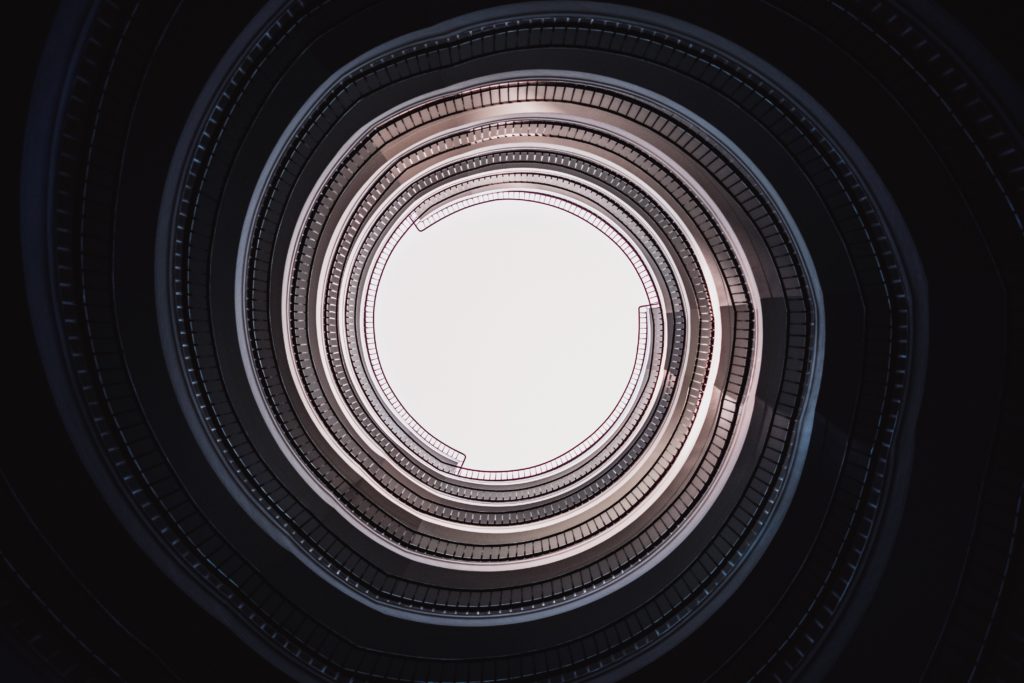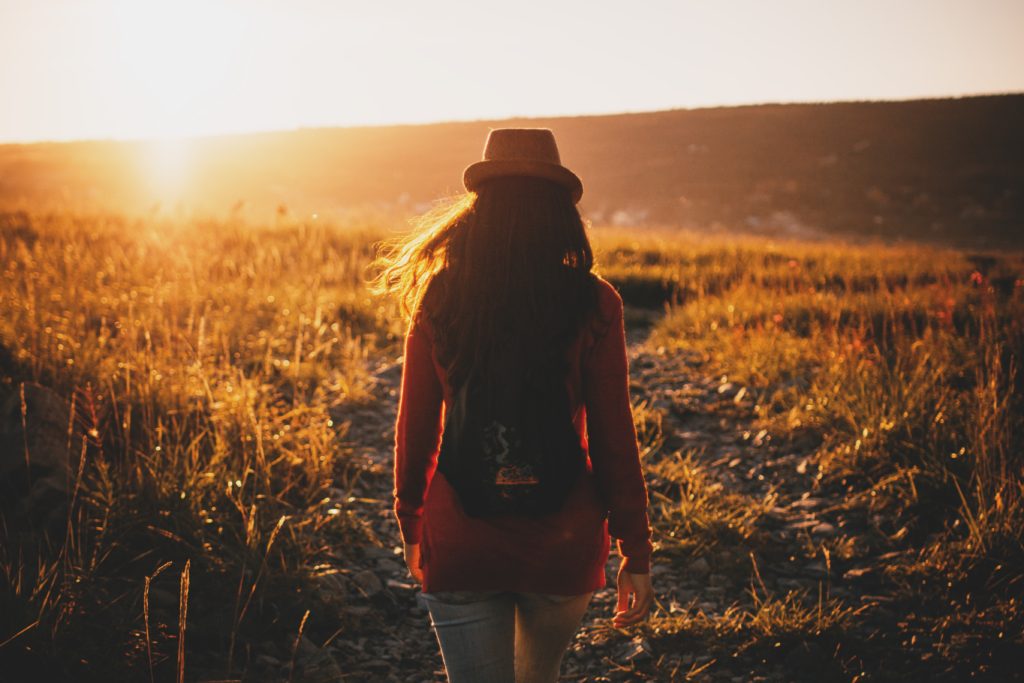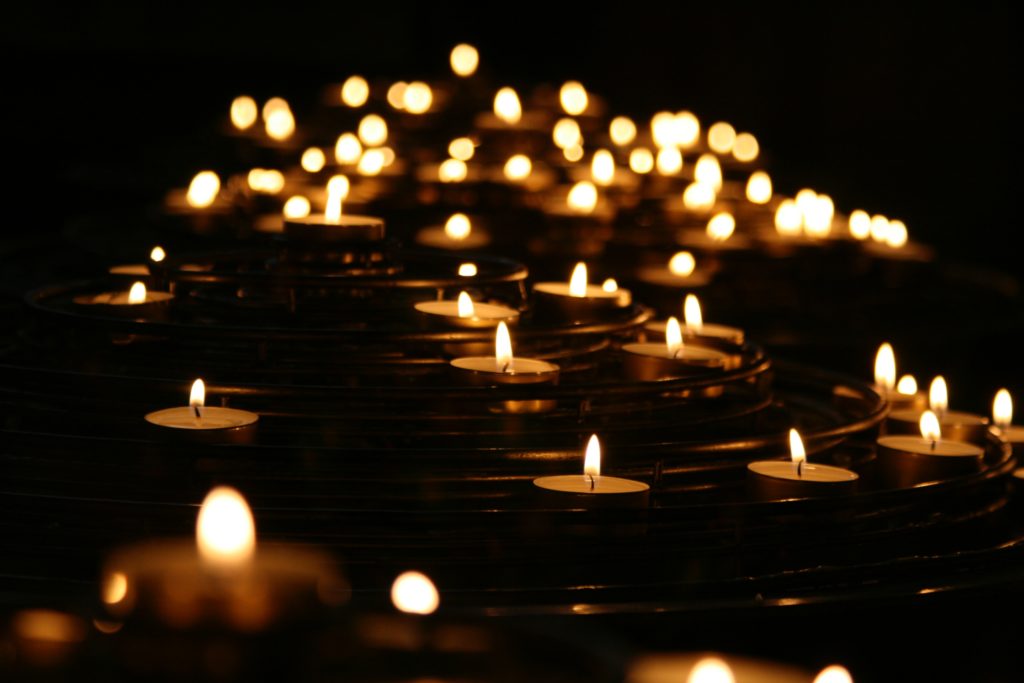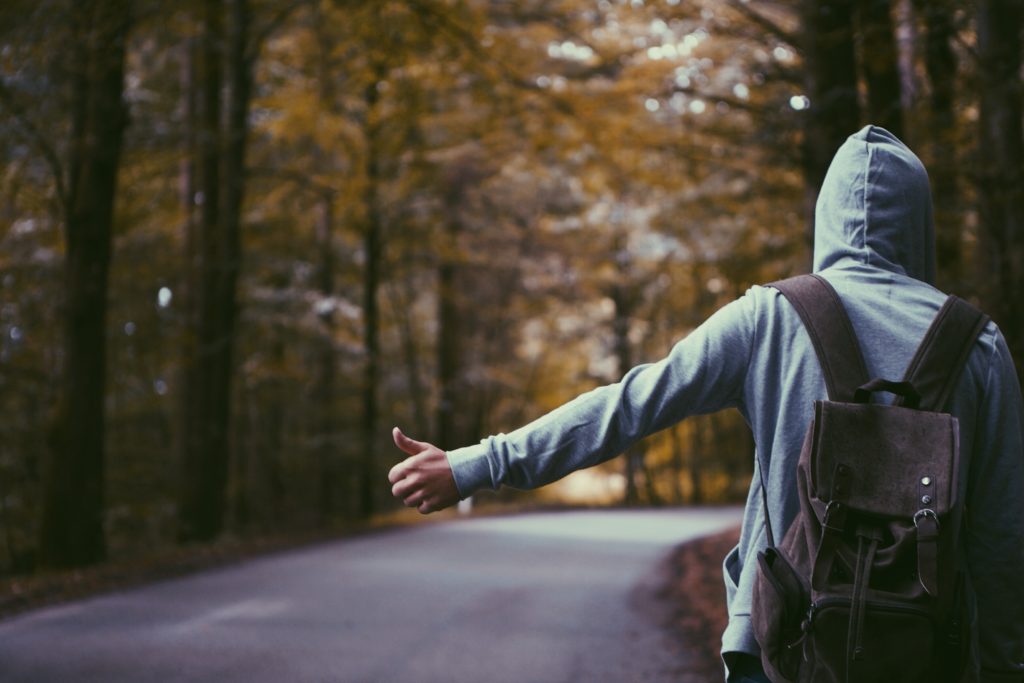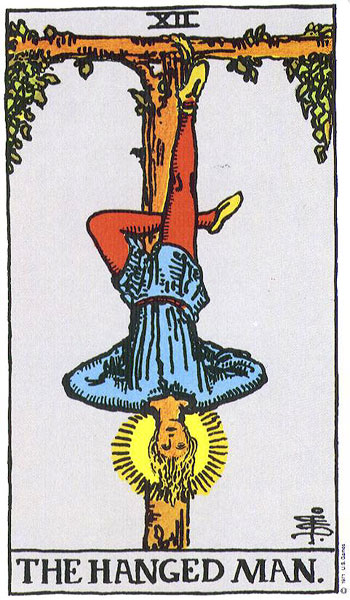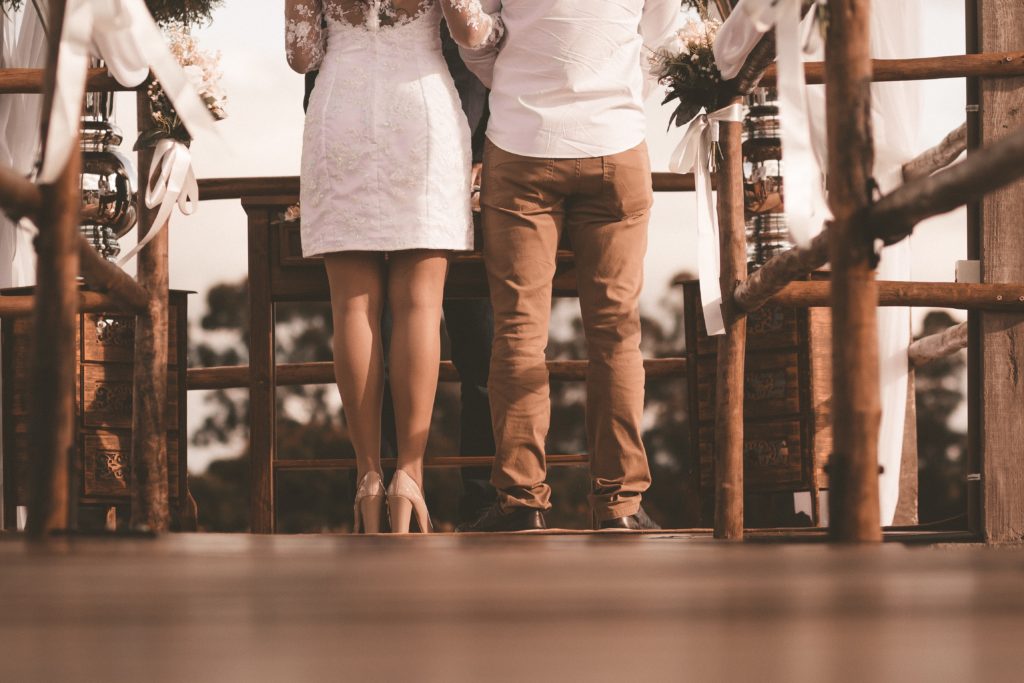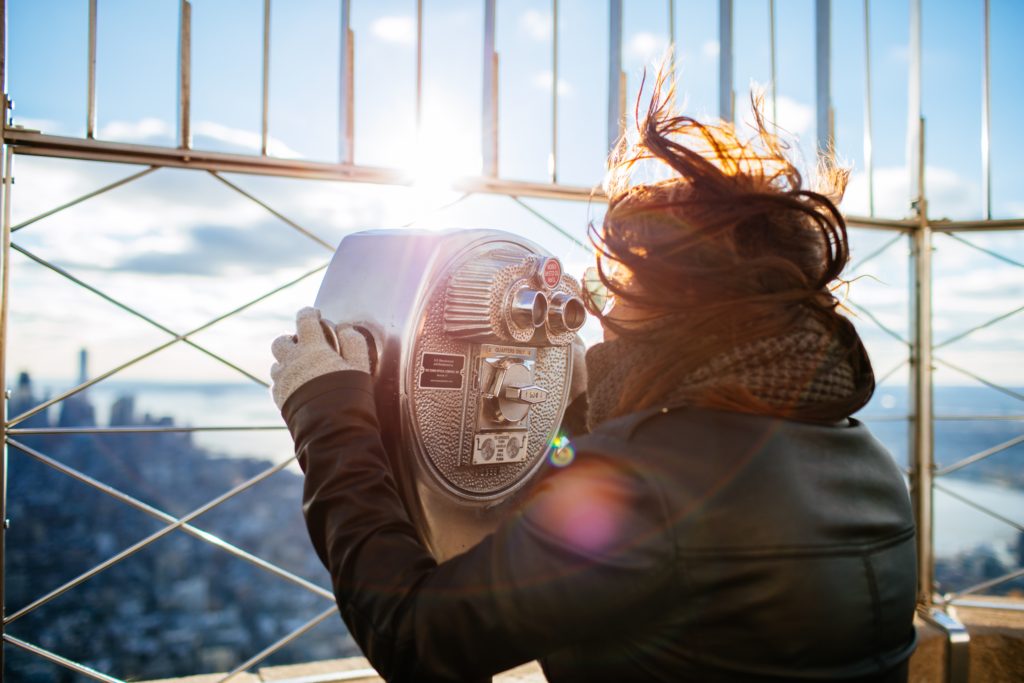The unexpected death of my colleague nearly a month ago unsettled me. I have a need for security and stability (we all do), and his death reminded me the world is not stable; it’s always changing. I want to know the people in my life will always be around, and if they’re dying, I want advanced notice so I can say a proper goodbye. But life doesn’t work like that, and Eric’s death reminds me a person can die at any time.
Goodness, even writing that I feel my anxiety levels rising. Let’s talk about solutions. Some of the messages I say to myself are, “I’m here. I’m not going anywhere. I’m not ever going anywhere.” On Saturday, I reminded myself those messages are true. I’m not going anywhere because when I die, all parts of me die. We’ll die together – my inner child, my inner parent, my higher self. I’m not ever going anywhere because every part of me is inextricably linked.
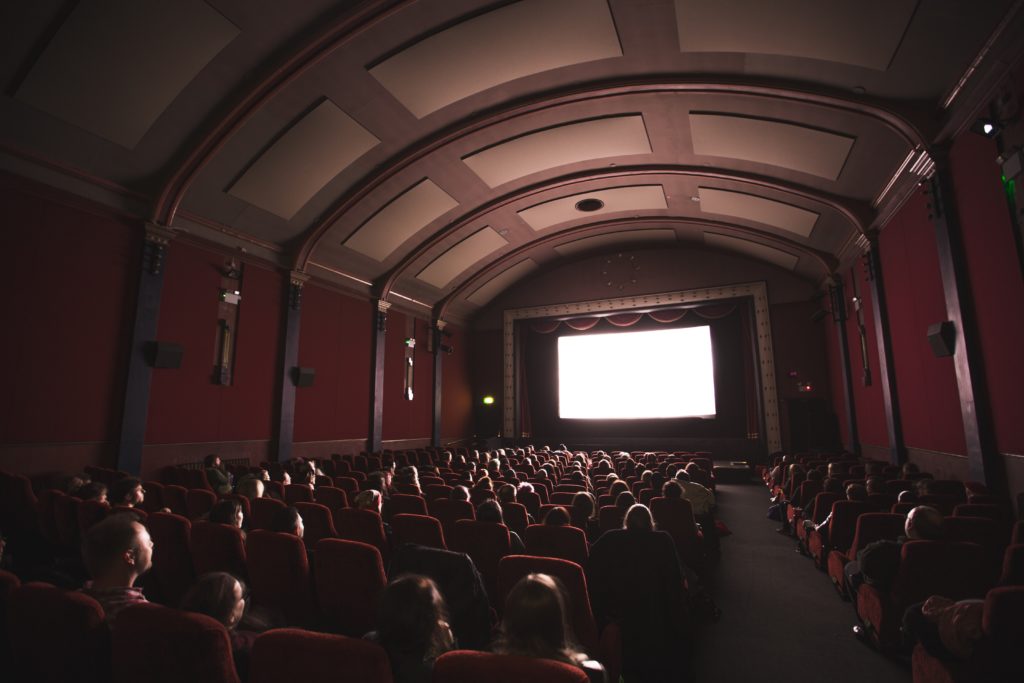
I like to think of our eternal companion as an audience member. Photo by Jake Hills on Unsplash.
I talk about “parts” a lot, but this is not New Age mumbo jumbo. In yoga philosophy, there are three parts of the mind. One of the parts, the mahatattva, is the observer. This is the part that’s like an audience member of a play – they see everything transpiring on the stage, but they’re not actively doing anything. That audience member, that eternal observer, if you will, is the one who has the best perspective because they literally see more than the actor on the stage.
When I self-soothe, when I remind myself I’m here and I’m not going anywhere, I connect with my observer self, which is where security and stability lies. That which is eternal is beyond spatial, temporal, and personal factors; it never changes and is always there.
My spiritual teacher says, “The unchangeable witnessing consciousness that lies behind the manifested, externalized states of consciousness, or behind these apparently conscious entities is Puruśa.” Puruśa is how I define God. Puruśa is the forever entity, the forever one who is inside of me, watching my every act. The point of my meditation practice is to realize Puruśa and I are the same. That I am it and it is me.
To quote an Indian sage, “Those of calm intellect who see Him within themselves alone attain eternal bliss. To them alone belongs abiding peace.” Over and over again I learn true security, stability, bliss, and peace cannot be found in the external world. It can only be found internally. My anxious self will never be satisfied with the constant presence of a person because people die or leave unexpectedly. They cannot be my eternal companions, but that doesn’t mean I don’t have one. Because I do. We all do. Our eternal companion, our forever one, is the witnessing entity within us and around us. The more I remember that, the better off I’ll be.
I dream of a world where we realize true security, stability, bliss, and peace comes from within. A world where we recognize we each have an internal observer, watching the drama of life unfold objectively. An observer who is with us always. A witness who is our forever companion.
Another world is not only possible, it’s probable.
The adjective I’d use to describe life right now is “surreal,” both on a personal level and a societal level. I’m still grappling with the death of my colleague, it seems strange he no longer exists on this earthly plane, and in addition, I’m reintegrating into normal life after having gone on vacation. I have a giant blue poncho that says, “I <3 Denmark” on the back of it, and yet, the entire experience feels like a dream. Did I really go there? Did I really see all the things I saw? I have the pictures to prove it, but somehow that doesn’t seem adequate right now. As a bit of a disclaimer, I’m sick so my rational brain is offline, giving everything a dreamy quality.
Even if everything wasn’t dreamy though, even if my brain was operating normally, some things I’d still classify as surreal. Our political situation, for instance. Regularly there’s a news story surfacing worthy of the Onion, a satirical publication, but instead the story is legitimate. How is this real life? Furthermore, what is real life?
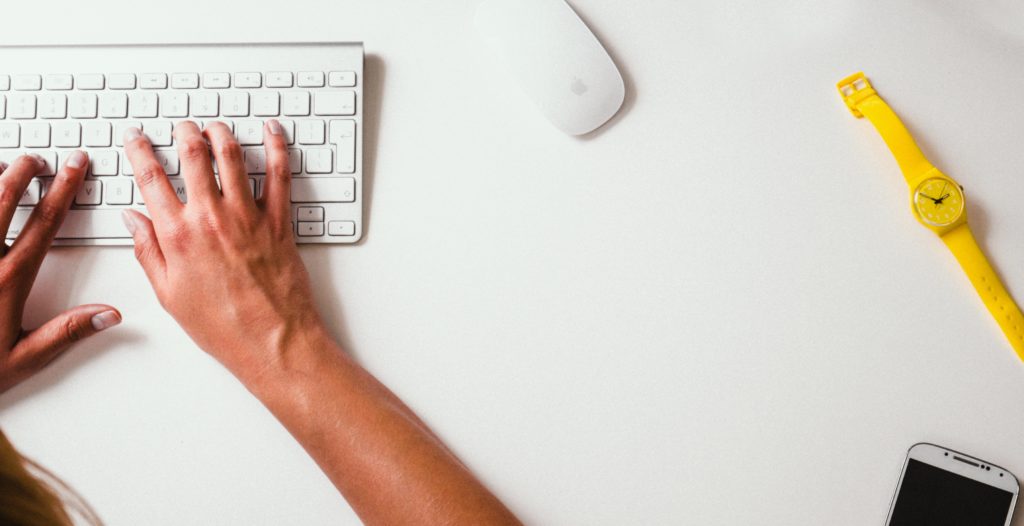
Eventually this, too, will stop being “real.” Photo by Damian Zaleski on Unsplash.
I’m not a philosopher, but the question has me curious. Some people say the entire world is an illusion, or máyá. Are they right? In short, no. Is my cough an illusion? Is the chair I’m sitting on fake? No. The world exists, it’s real, but also the world is a relative truth, according to my spiritual teacher.
“No worldly form remains unchanged for a long period of time,” he said. “The world always undergoes metamorphosis; this is how it maintains its existence – through evolution, through transformation.” That means what’s true today may not be true tomorrow. For instance, I’m sick today but I won’t be sick next month, I hope. My chair exists today, but 200 years from now it will not. It’s kind of a scary thing for me to contemplate, that we live in a world where everything is temporary and reality is changeable, but the evidence proves this over and over again. For instance, it wasn’t all that long ago that people thought germs were mythical.
Some people say reality is that which can be measured and proven scientifically, but as was once the case with germs, there are things in existence our instruments are not sensitive enough to measure yet. Does that make them any less real? As much as I’d like to define reality, I’m discovering I can’t because reality is always changing. I’m going to cop out here and circle back to my perennial topic: spirituality.
According to my spiritual treatise, the world is relative, but there is something absolute. There is something unchangeable and eternal, a solid foundation, a rock to which I may cling. There is an eternal, formless, unchangeable entity that pervades all of existence. It is to that entity, which exists both inside of me and outside of me, to whom I’m moving closer. It is to that entity I pay my salutations when I meditate. It is that entity who helps me unearth an absolute reality, which is something I wish for all of us.
I dream of a world where we remember the world is not an illusion, the world is real, but it’s constantly changing. A world where we let this fact fill us with hope because we realize that means things will never stay the same, and thus can always become better. A world where we live in our relative reality while also working toward that which is absolute.
Another world is not only possible, it’s probable.
The other week I read an interesting philosophical treatise about the structure of our universe, which is an oval. We are made up of atoms with electrons moving around a nucleus. On a larger scale, the Earth is the nucleus and the moon is moving around it. In our solar system, the sun is the nucleus and all the planets are moving around it. According to my spiritual philosophy, there is a Supreme nucleus and we are all moving around it.
Is that Supreme hub a place we can get to? Can I jump into a rocketship and go see it? Is the Supreme nucleus instead a metaphor? I do not know the answers to these questions, but a friend commented on this discourse and said we are all emanating out from the same nucleus. We all have the same center, the same core.
His comment struck me because regardless of whether or not a person believes in a Cosmic Consciousness, or subscribes to my spiritual philosophy, we do have the same core. It is a fact we are all made up of atoms. It is a fact we are all made up of stardust, to paraphrase Carl Sagan. To quote an article on the subject:
“The carbon, nitrogen, and oxygen atoms in our bodies, as well as atoms of all other heavy elements, were created in previous generations of stars over 4.5 billion years ago. Because humans and every other animal as well as most of the matter on Earth contain these elements, we are literally made of star stuff.”
I’ve been hearing about this concept for many years so it’s easy for me to gloss over it, but something about thinking how we all have the same core got to me. It allows me to connect with you even deeper because inside we are the same, and knowingly or unknowingly, we are moving together. Some people are moving closer to the Supreme hub. I would say the Dalai Lama or Pope Francis are great examples of people who are moving closer to Cosmic Consciousness because they have a universal outlook. They seem to look upon others with a sense of oneness, that we are all connected, that there is no difference between them and someone else.
My spiritual teacher says, “Each and every aspirant, each and every artist, each and every scientist, and each and every philosopher must be ensconced in this supreme veracity – that they will have to be one with the Supreme, that each will have to coincide his or her microcosmic nucleus with the macrocosmic one.”
The speed with which this happens varies, and some people move further away from the nucleus, but no one can move beyond its scope. Even the most terrible person, even the most despised people are still circling the nucleus. They may be at the periphery, but they still have the same nucleus, and that means I can recognize those people, too, are my brothers and sisters. They, too, are on the spiritual journey with me and that means I can soften my heart toward them. Because we are all connected at the core.
I dream of a world where we recognize we are all made of the same things. A world where we recognize we all emanate from the same source. A world where we remember we are all connected at the core.
Another world is not only possible, it’s probable.
Last week, I wrote about the death of a colleague. In addition to grieving, I’m learning a lot about intimacy.
So often when I think about intimacy, it’s in the context of a romantic relationship, but the truth is, intimacy is not confined to a romantic partner. Real intimacy is like unzipping yourself and displaying your insides, and that can be done with anyone, something I’ve witnessed in this process.
As I share the news about my co-worker’s death, people react in different ways. Some people allow me to cry without offering a diversion or attempting to fix it. Other people become discomfited and say a quick, “I’m sorry,” before moving on to another topic. I’m not deriding people for their reactions – people are where they’re at and will respond how they do. What I notice though is in order to share my feelings with someone else, to be intimate with them, I have to acknowledge my feelings first. If I’m uncomfortable feeling sad, there’s no way I can share that with someone else because I’m shutting the feelings down internally. Someone else may be more than willing to share and connect with me, but if I’m not connected to myself, no one else can connect with me either.
We hear often, “You can’t give what you don’t have,” but I’m a concrete gal and I like examples. As an example, if someone asked me for oranges right now, I’d have to shake my head and say, “Sorry, I don’t have any.” Similarly, I can’t give intimacy if I don’t have it internally.
We think of intimacy and love as “out there,” something to find or force. I can’t tell you how many times I’ve complained about certain men in my life, lamenting that they’re not opening up, as if they were clams I could pry open. I’ve craved intimacy, but it’s only been within recent years I’ve created it internally by embracing all of my emotions. By giving myself space to feel.
Love and intimacy get presented as if we could walk into a store and buy them. We don’t realize intimacy is something we create, something we work on internally. I could be in relationship with the most amazing person, someone who loves intimacy, but if I’m not in touch with my own feelings, if I’m not allowing myself to feel them, we won’t have intimacy. It will be like talking to a brick wall. I say this because that’s also been my experience in grieving. When I share my insides with people who are discomfited, it’s like I threw an egg against a brick wall – my insides are smeared, on display. There’s no reciprocity, only impact. When I share my insides with people who are comfortable with emotion, it’s like I threw an egg at a cloud of cotton – I feel held, comforted, and supported.
Matt Licata, a psychotherapist I follow, synthesizes this concept well:
When all is said and done, perhaps there is no secret to co-creating a fulfilling, supportive, mutually beneficial intimate relationship, as it is always in the end a movement of the unknown. Healthy intimacy is not something you will figure out one day by way of some checklist or magical formula, but something you are asked to live in each moment, in all its chaotic glory. By learning to take care of yourself, you are creating a foundation upon which the mysteries of intimacy can come alive within and around you, providing a crucible like no other for the great work of aliveness that you have come here to embody.
I dream of a world where we embody our emotions. A world where we understand intimacy is not something “out there,” but rather “in here.” A world where we recognize intimacy is not something we find, but rather something we create. A world where we realize intimacy beings with us.
Another world is not only possible, it’s probable.
I found out on Thursday a work colleague of mine died unexpectedly. No warning, no known life-threatening health issues, just gone. Out like a candle. It reminds me of that passage from Macbeth:
Out, out, brief candle!
Life’s but a walking shadow, a poor player,
That struts and frets his hour upon the stage,
And then is heard no more.
I’m still in shock to be honest. Here one minute, gone the next. It doesn’t seem real. I know some people experience a shift in perspective at times like these. It reminds them life is short and not to waste a minute of it. This it not that sort of blogpost. I will not suddenly seize the day or live like I’ll die tomorrow, because for me, that sort of pace will kill me. I know this because living with that mindset has wrecked my body. Instead, this post is a meditation on transience.
My colleague’s death reminds me that everything – my thoughts, my feelings, even my life – has an end. I trick myself otherwise, convinced every feeling and situation is interminable, but in truth, it’s not. We often say, “This, too, shall pass,” forgetting “this” also includes life itself.
I’m still coming out of shock and into grief, yet I feel at peace, not about my colleague’s death, but about the nature of life itself. I’m in deep acceptance that I don’t have as much agency as I think I do. That I can eat well, exercise, wear sunscreen, but when I die is not up to me. I will be here as long as I am here.
In my spiritual tradition, we say a person will merge in Cosmic Consciousness only after completing the duty assigned to him or her by Cosmic Consciousness. The trouble is, there’s no sand timer in the sky letting us know when the sand has run out. And what’s interesting is the older I get, the more I understand what people mean when they say life goes by quickly. With that in mind, I have no trouble believing I could live until I was 120 and it would still feel too short. It would still feel like a flash in the pan. In truth, no matter how long we live, it will always be a brief moment in time, a period when for a short while we walked the Earth.
My spiritual teacher says, “This expressed universe is nothing but a collection of temporary entities which are undergoing constant metamorphosis according to the sweet will of nature.” We are all temporary entities and we are all constantly undergoing change. Nothing stays the same. Nothing. I can’t help but wonder if I kept this thought at the forefront of my mind how my life would be different. If I would experience more ease and peace as well as joy knowing my life is like a candle that can be blown out at any moment.
This post is a somber one, I know, but I hope it will also be a reassuring one. For those of you undergoing hardship, remember it will end. And for those of you undergoing ecstasy, enjoy it while you can, because it, too, will end.
I dream of a world where we remember all things are temporary. A world where we realize we’re not in control of everything. A world where we practice acceptance of what is because we recognize like everything else, this, too, shall pass.
Another world is not only possible, it’s probable.
Historically, one of the ways I’ve dealt with uncertainty and ambiguity is to become controlling. If I didn’t know what was going on, I’d make a plan or force a decision so that I did, because then at least I’d know, and knowing was more comfortable than not knowing.
It should come as no surprise I was a stage manager in high school, and for a couple of years in college. For those unaware, the stage manager is the person behind the scenes of a show who is calling all the lighting and sound cues, the person who makes sure the sets are moving when they should, the person who determines when the show starts, even. This is not done without input or help, but the ultimate responsibility is the stage manager’s. I loved stage managing. At last my character traits of controlling and perfectionism were put to good use. Instead of being disparaged for them, I was lauded.
Unfortunately, while all the world’s a stage, I’m not the stage manager. Nor did I get the script in advance. For someone prone to anxiety, and who likes to know what’s happening beforehand, this is not a good combination. To manage this, I could have become the type of person who does the same thing every day, who sticks to a schedule rigidly, who never tries anything new, who lives in a safe container of the known and the familiar, but I get bored and restless. Well shucks. What’s a gal to do then?
Lately, instead of defaulting to controlling, I’m allowing all of my feelings. I’m letting it be OK that I’m scared. I’m letting it be OK that I think things should be this way or that. I’m also letting it be OK that there’s a part of me itching to decide one way or another. These days I’m letting all my parts co-exist and that means accepting uncertainty. The truth is, for all my planning, nothing ever happened the way I thought it would anyway. That doesn’t mean I’ll stop planning altogether – I will never be a person who’s comfortable flying into a foreign city without knowing where she’s sleeping that night – but it also means I’m allowing for flexibility.
According to my spiritual teacher, and many teachers, adjustment and flexibility are essentials for human progress. My teacher says, “Intelligent people will not cling to old, outdated ideas. Rather they will wholeheartedly embrace that theory which adjusts with time, space, and person, and will continue to exist forever.”
He’s speaking about societal theories here, but I think the same principle applies on an individual level. I must discard old and outdated ways of being in the world. Handling uncertainty by clinging to a fixed plan no longer serves me. Dealing with ambiguity by forcing a decision before the answer is clear no longer works for me. The only person I have any agency over is me, and treating myself with gentleness, humor, love, and respect sounds like the best plan to deal with uncertainty that I could ever concoct.
I dream of a world where we accept uncertainty. A world where we realize nothing will ever go exactly the way we planned. A world where we embrace flexibility and adjustment while we move ahead on the path of our lives. A world where we allow all parts of ourselves to exist in peaceful harmony.
Another world is not only possible, it’s probable.
I am obsessed with progress and growth. I want to do and to achieve all the time. One of my worst fears is getting stuck, of being trapped. It should come as no surprise then I’m claustrophobic and freak out in large crowds when I can’t move as freely as I’d like. It’s not only an external fear, but an internal one.
The thing about my health is I feel stuck. There are many things I cannot do right now. As I’ve written about previously, my dreams are on hold and that suuuuuucks.
I called a friend this week to share my fears with him, and instead of dissuading me from my current perspective, he told me he’s been meditating on the tarot card the hanged man. Some would view the image of a hanged man as violent, something to fear and avoid. My friend however said he views the hanged man as being suspended instead of hanged. Of being still, in a pause, held. And perhaps the same applies to my life right now. That I don’t have to do anything, and instead of fighting the stuckness, I can enjoy the sense of ease that can arise because it’s a moment in time when the divine is holding the rope and keeping me in place. Instead of stuck, I’m held in suspension.
I like thinking of it in that way and also I’m reminded there’s more here. It’s important for me to relax while I’m suspended, to embrace the inactive part of me.
In my spiritual philosophy, there are three binding forces in the world called gunas. The forces are sattvic, or sentient, rajasic, or mutative, and tamasic, or static. All beings have a mixture of these forces within them to varying degrees. I can say without a doubt I’ve been denying the static force within me. I’ve been pretending that part of me doesn’t exist, and furthermore, not giving it expression in any way. Even when I’m at home, relaxing, there is an internal struggle within me that says I should be doing something else. Something productive. And even though I haven’t paid attention to that voice, even though I stay where I am and keep reading my book, the voice still lives within me.
This week something shifted and I’m yielding to inertia, to laziness. You would think it’s easy because, “Woohoo! Green light to sit around and watch Netflix all day!” but actually, it’s been excruciating. This week I’ve been crawling out of my skin with how uncomfortable I am. And in fact, instead of embracing laziness, on Friday night I cleaned my bathroom. So. You know. Still learning over here.
Again, as I think of my spiritual philosophy though, it’s one of wholeness and integration. One where we view everything as an expression of an infinite loving consciousness, and that means the static side too. That means the lazy, do-nothing part of me is also divine and I’m not doing myself any favors by pretending it’s not. There is a time and a place for everything, and right now, it’s time for me to be lazy without guilt.
I dream of a world where we embrace all the forces within us. A world where we view all periods of our life as sacred. A world where even if we feel stuck, instead we start thinking of it as being held while in suspension.
Another world is not only possible, it’s probable.
I’m reminded even when life doesn’t look the way we want it to, grace can still be found. On a macro level, there are some aspects of my life that are not how I’d pictured them, and it’s easy to sink into woe. At the same time, there can be grace in the gunk.
I’m not saying to avoid feeling woeful – everyone needs a good cry now and again – but it’s interesting for me to note in the midst of not-fun things I can experience wonder and delight. Life is complicated like that.
Last weekend I traveled to Philadelphia for a wedding of a dear friend of mine. It was beautiful and touching and sweet, but I anticipated that. What I didn’t anticipate were the other moments of grace that remind me there is a divine intelligence in the world, and that it cares about me.
Following the last dance at the wedding, the brides (it was a lesbian wedding) rushed out the door under a canopy of rustling wands that we, the guests, held above their heads. Therefore, I didn’t get to say a proper goodbye, which saddened me. The next day, while in the lobby, the elevator door pinged open and there stood one of the brides. I was able to say a few words before the door shut again and we went our separate ways. Quite literally in this case because she descended to the ground floor while I ascended to the fifth. An hour later, I took the elevator to the ground floor and ran into the other bride, my friend, while she waited for her elevator. We had a longer conversation and a proper hug goodbye. If I had left a few moments earlier or later, I would have missed her.
The same day, I trundled around Philadelphia with my rolling luggage, soaking up the sights. Due to losing my way, I arrived at the train station at 4:25, the exact time my train was scheduled to depart. I purchased my ticket and was informed the train was running two minutes late, which meant I just barely caught my train. And I do mean just barely. The train doors had already closed by the time I arrived, but the train conductor reopened them for me.
A few more things happened, like my flight arriving half an hour early even though we left later than our departure time. They aren’t huge things, and they don’t fix the macro issues in my life like my health or my finances, but they’re enough to remind me grace is here, too. I can have poor health and poor finances and still be taken care of. Furthermore, I didn’t orchestrate any of the things I experienced. I didn’t manifest it or attract it or visualize it or have any control in the matter whatsoever.
And that’s the thing about grace – it’s not rational, it doesn’t follow a formula. It just comes. My spiritual teacher says God’s grace is for all – both the virtuous and nonvirtuous. Nobody is unimportant or insignificant. Everyone is a divine child and grace is always with us, even in the gunk.
I dream of a world where we all feel graced. A world where we feel the love that surrounds us. A world where we know grace is not a reward for good behavior, it’s given regardless. A world where we find grace in the gunk.
Another world is not only possible, it’s probable.
I found out recently in China if a woman is unmarried by age 27, she’s called “sheng nu,” or “leftover woman.” And if you’re 30 and unmarried? Forget it. Life’s over. That’s literally what these women are told. The whole thing makes my blood boil.
I think what pisses me off most of all is the notion that if a woman has a Master’s degree, or is successful in her field, or if she’s helping others and just generally being a good human, she’s still considered “less than” all because she doesn’t have a ring on her finger. Are you kidding me? When did our worth become defined by our relationship status? When did getting married become the most important metric?
It should be noted here I’m not anti-marriage. I’ve been to about 20 weddings in the past 10 years and am currently at one this weekend. I love weddings. I love marriage. But I do not love the idea that somehow a person is “left over” if they’re still single by a certain age. I say this to myself, too. There’s a part of me that asks, “What’s wrong with me that I’m still single?” I have imagined conversations with people justifying why I’m not married because even internally, I feel a twinge of shame that at my age, 32.5, I’m unmarried. However, hearing about these women in China who are harassed and shamed by their families on a regular basis for being single put me over the edge.
This is not a post where I say there’s nothing wrong with being single, or that there’s a pot for every lid, that eventually we all meet our match. No. This is a post where I fume at patriarchy, which is the precise system that dictates a woman is worthless if she isn’t married. I realize some men feel this way too, but in articles about unmarried Chinese men, it’s couched as a supply issue – too few women – whereas in articles about Chinese women, it’s couched as some unfortunate mystery. That somehow it’s the woman’s fault she’s still single. That my friends, is patriarchy.
My spiritual teacher says, in society the value of a woman is not an iota less than that of a man. And furthermore, every human being is a divine child of God – both the unmarried and the married. That means I could be single until my dying days and my value would not be any less. That means I could be single forever and still do great and worthwhile things. My worth does not go up and down depending on my relationship status, and neither does yours.
I realize some people will still look at me and ask, “Why is she still single? What’s wrong with her?” I can’t do anything about that, but I can do something about my internal dialogue. I can remind myself I’m amazing with or without a partner. And I can do my part to extricate myself from a system that works to make me feel inferior because I’m single. I’m not inferior and neither is anyone else, regardless of their romantic situation.
I dream of a world where we realize our relationship status doesn’t define our value. A world where we recognize shaming people for being single is just another form of oppression, of subtly saying they’re only worth something if they’re attached to someone else. A world where we realize we are fantastic and amazing human beings whether we’re in a relationship or not.
Another world is not only possible, it’s probable.
This weekend I saw Wonder Woman and loved it. Something about watching a female superhero really got to me in a way I didn’t expect. I started tearing up. As I teared up, I was reminded this has been a long time coming. Not only the movie, which it has, but more importantly, equality for women, which we’re still working on.
Last year I would have told you things aren’t perfect, but we as a society have progressed far in terms of equal rights for women. This year I can say that statement is both true and not true. It’s true women no longer need a husband to open up a credit card account (which wasn’t the case until 1974, by the way), but at the same time, we also earn less than men. And the amount is far less for women of color. Also, I can’t pretend women are treated fairly in the U.S. when our current president was recorded as saying as a star, he can do anything, he can grab women by the pussy. Neither can I pretend women are treated fairly in the U.S. when the penalty for sexual assault is so lenient. It’s obvious many in power think of women as inferior beings.
At the same time, I have to admit not everyone in power thinks of women as inferior, and we have more women in positions of power not only in politics, such as Prime Minister Theresa May and Angela Merkel, but business as well, such as Sheryl Sandberg and Arianna Huffington. What I find baffling is what many don’t seem to grasp, is the better life is for women, the better life is for everyone. I don’t mean that in the sense, “Happy wife, happy life.” I mean, when women are educated, society flourishes.
My spiritual teacher says, “Ideally, women should also move with their own strength and with the same speed as their male counterparts. In the process of movement, if they feel pain in their legs, if they fall on their faces, they should be physically lifted up. The fact is that we must move together in unison with all.” Moving together in unison with all means we all go far. If men are allowed to dominate and demean, we as a society are like a bird flying with one wing.
Don’t get me wrong, I’m not saying women should have equal rights only because it means we all benefit. All human beings should have equal rights. I don’t understand why it’s even a question. My teacher also says, “Women should have as much unbarred liberty to enjoy the light, air, earth, and water like children of nature as men have. In fact, it is not a case of granting rights to women, it is a case of recognizing their rights.”
We already have rights that are not recognized. What will it take for those rights to be recognized? I’m not sure, but I am confident the old ways of thinking will crumble into dust. Just as the Wonder Woman movie was finally made, eventually all women will have equal rights. It will take time, but it will happen. One more quote to end on: “Let women be the vanguard of a new revolution which humanity must achieve for a glorious tomorrow.”
I dream of a world where women lead a revolution that achieves a glorious tomorrow. A world where women’s inherent rights are recognized. A world where all women everywhere shake off the slumber of dogma and inferiority, breaking the shackles that chain them. A world where women wake up to the true magnificence of who they are.
Another world is not only possible, it’s probable.
